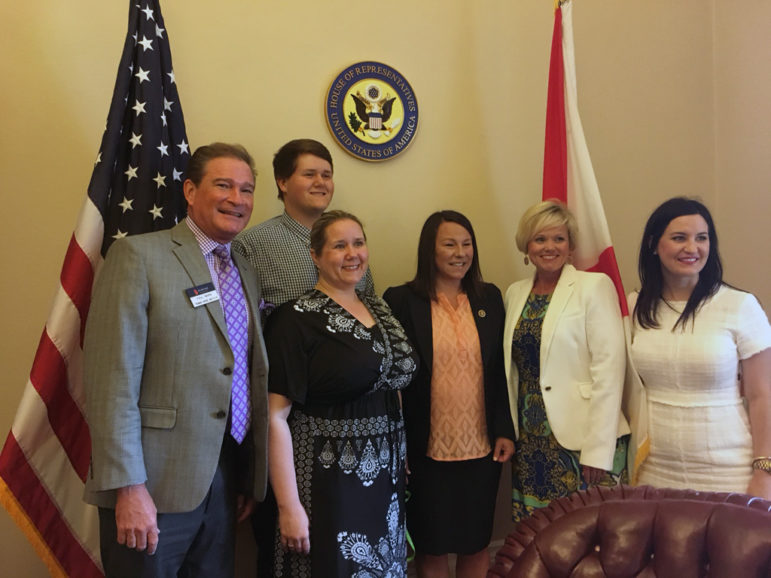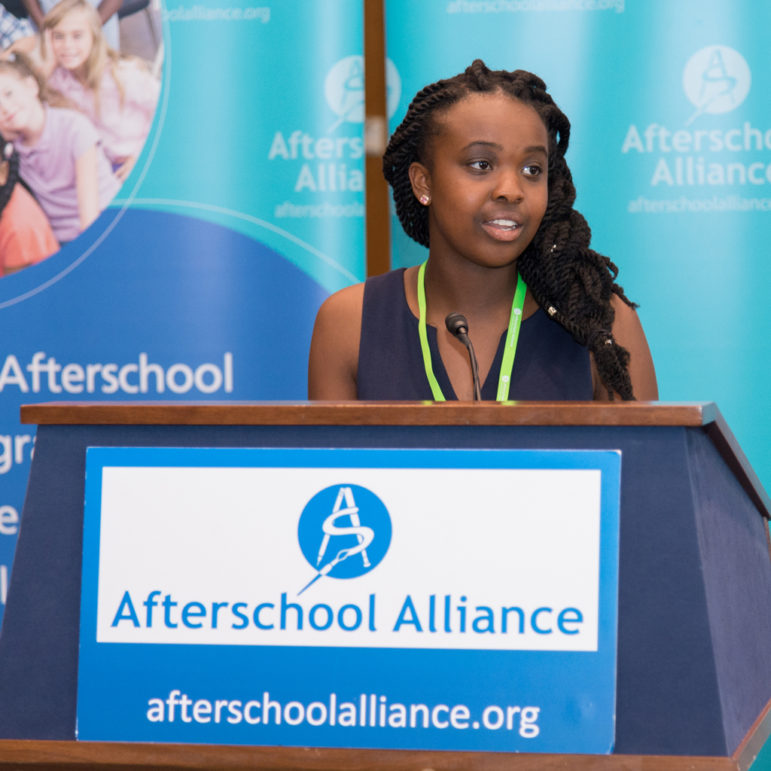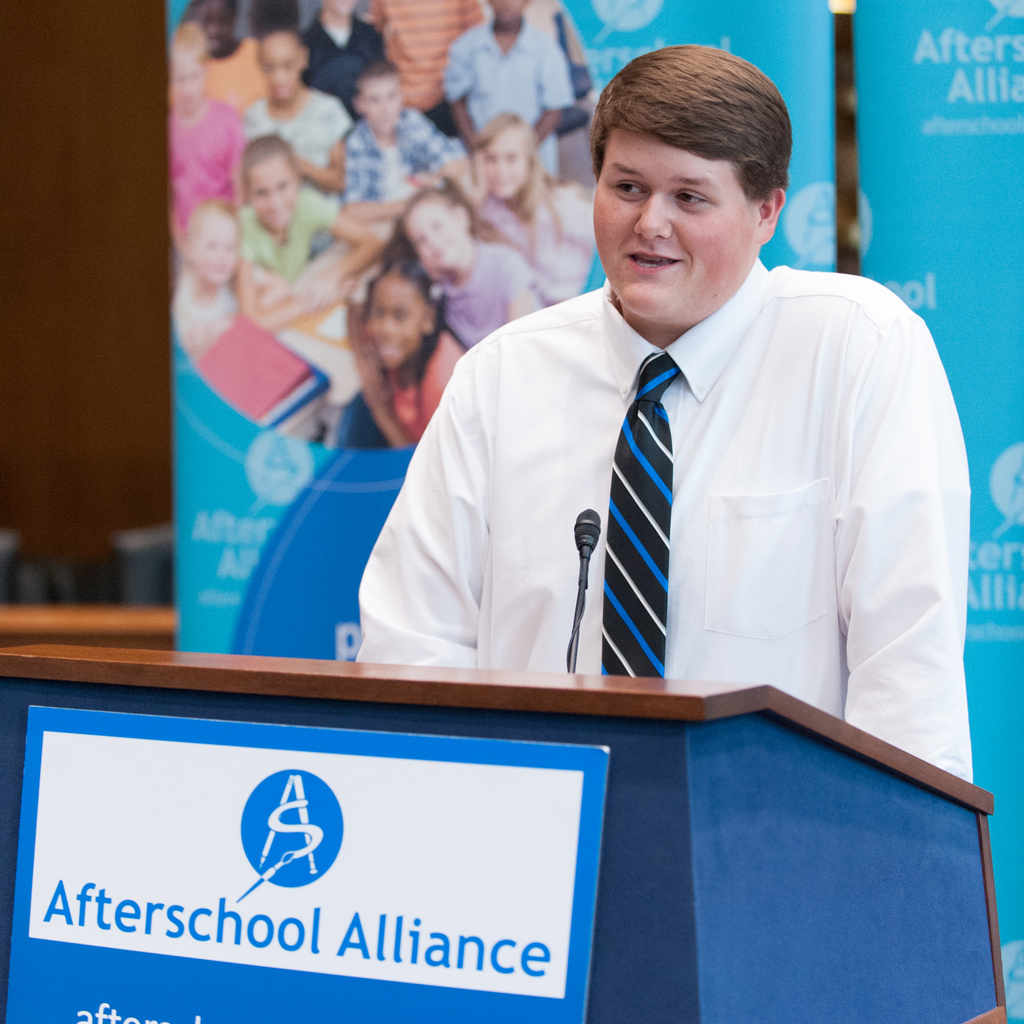Colby Holmes, a recent high school graduate from the small town of New Hope, Alabama, found himself on Capitol Hill this week. He and his mother came with Paul Morin, coordinator of the Alabama Afterschool Community Network.
A year ago, Colby was experimenting with making portable solar panels in an after-school program funded by 21st Century Community Learning Centers and Boeing Corp.
In the process he found a career path. He’s heading to community college and plans to become an electrician.
Morin wanted to show Alabama senators and representatives the impact of the science, technology, engineering and math (STEM) program at New Hope High School. He made the trip to Washington as part of the Afterschool Alliance’s day of lobbying. Morin spoke passionately about the need.
“It’s not politics,” Morin said. “It’s about our children’s lives.”
He wants to create a STEM pipeline for youth to move into jobs they otherwise might not have access to.
New Hope is a small community not far from Huntsville, Alabama, the state’s aerospace hub. But it might also be a world away, with about half its population living below the poverty threshold.
Some of the youth there have never “been over the mountain” to Huntsville, Morin said.
Big manufacturing companies in Alabama are looking for skilled workers for jobs they say they can’t fill.
After-school programs can provide the connection, he said, because they engage kids in a different way than school does.
In schools, kids are doing reading, writing and arithmetic, Morin said. “They don’t see the real-world relevance [of what they’re studying],” he said.

Recent high school graduate Colby Holmes (standing behind his mother Kelley Quakenbaum) traveled to Washington from his home in New Hope, Alabama, to talk about the impact of his after-school STEM program. Among members of Congress he met were Rep. Martha Roby, R-Alabama. From left are Alabama Afterschool Community Alliance Coordinator Paul Morin, Holmes, Quakenbaum, Roby, University of Alabama Grant Administrator Felicia Simpson and Leah Garner of the Business Council of Alabama.
But the 21st Century STEM program at New Hope High School engaged Colby and other kids in looking around their community to assess its needs. The group found that some people in the area didn’t have heating and air conditioning in their houses.
The students worked to create a portable solar panel that could be used for heating and cooling.
Their first model didn’t work, Morin said, but the kids problem-solved to refashion it.
Science and technology require creativity and inventiveness, Morin said. After-school programs let kids be creative, explore and even fail, he said.
“That’s where creativity and inventiveness come from,” he said. “After-school should be part of the equation.”
Kids can do significant learning after school, they have a safe place to go while their parents are working, and programs have an impact on their future, he said.
Morin said that Colby’s mother credited the program for helping her, a single parent with four children, go back to school, get a job and move off food stamps and Medicaid.
He was responding to a White House budget that would cut federal funding for after-school programs across the nation by eliminating the Department of Education’s 21st Century program. The Afterschool Alliance has mounted a campaign to highlight the value of the program.
Society has changed, Morin said, and parents — many of whom are single parents — are working in jobs. They need after-school programs, he said.
Jazmyne McNair, a recent high school graduate from Lawrence, Kansas, was also in Washington on Wednesday; with Colby Wilson, the executive director of the Boys & Girls Clubs of Lawrence.

Jazmyne McNair
“My mom was a single parent and a teacher and had very long hours,” she said. The Boys & Girls Club provided a place for Jazmyn, her brother and sister to be after school.
“A lot of people assume it’s another day care program,” she said. In fact, it’s the place she learned skills that helped her get multiple scholarships covering full tuition at Coe College in Cedar Rapids, Iowa.
In the after-school program, she got help applying to colleges, writing essays and preparing for college admission interviews, she said. She learned time management skills for her schoolwork.
Now she’s involved in a plan to build a teen center at the Boys & Girls Club of Lawrence so older youth can mentor younger ones, she said. She plans to study in college to become a teacher.
The Boys & Girls Club had a big impact on her life, she told members of Congress.
FOR MORE INFORMATION ON CAREER & TECHNOLOGY EDUCATION IN OST, GO TO THE YOUTH TODAY OST HUB.






























